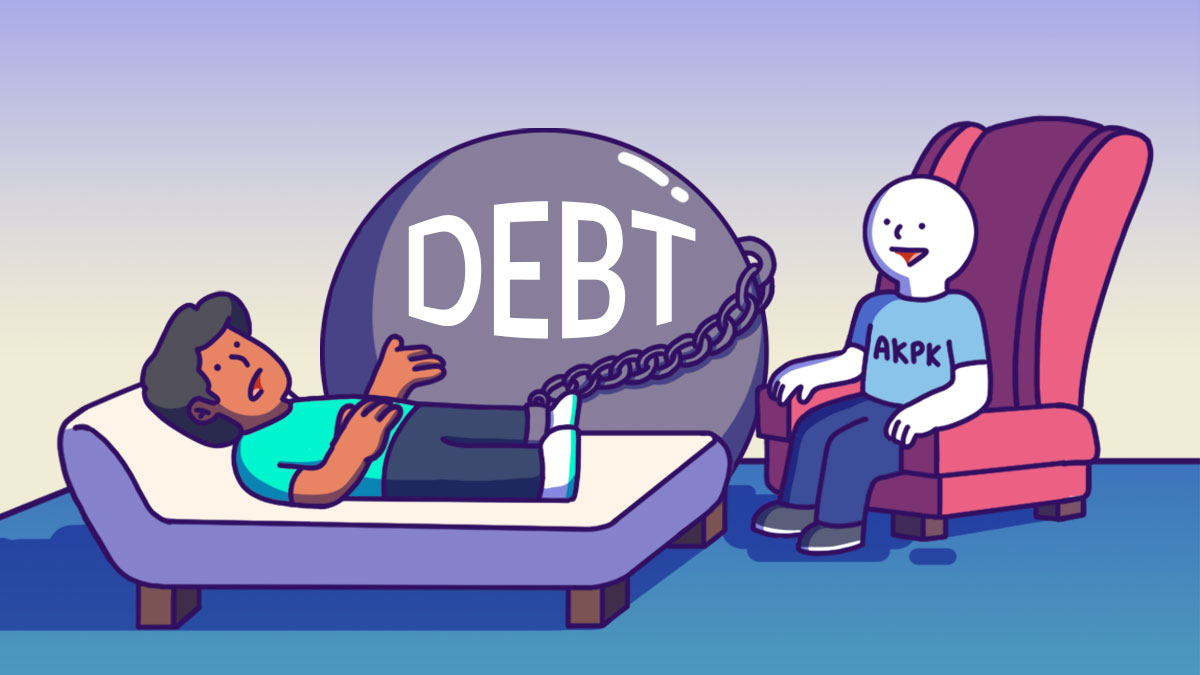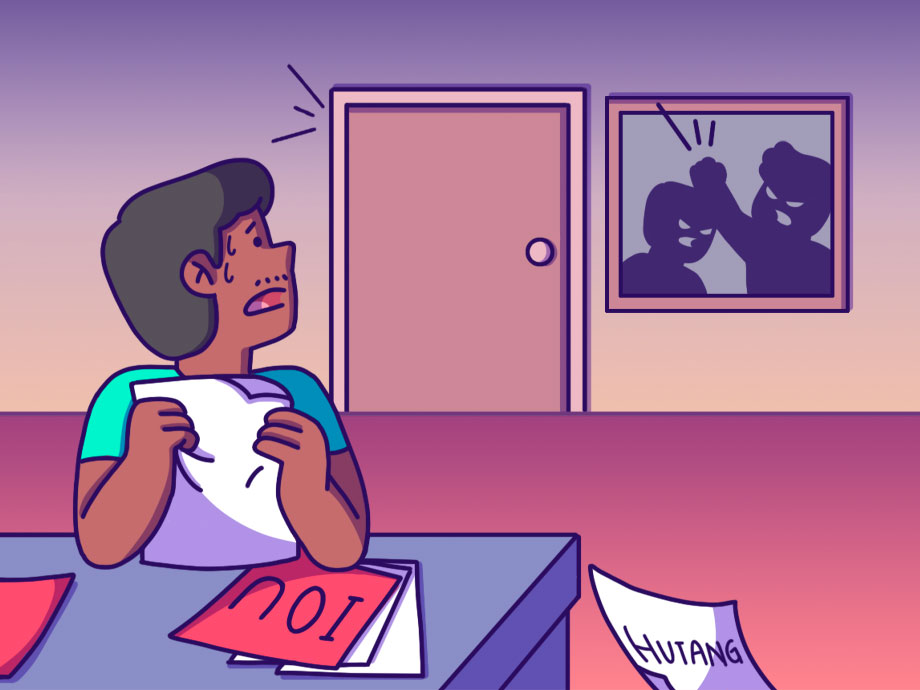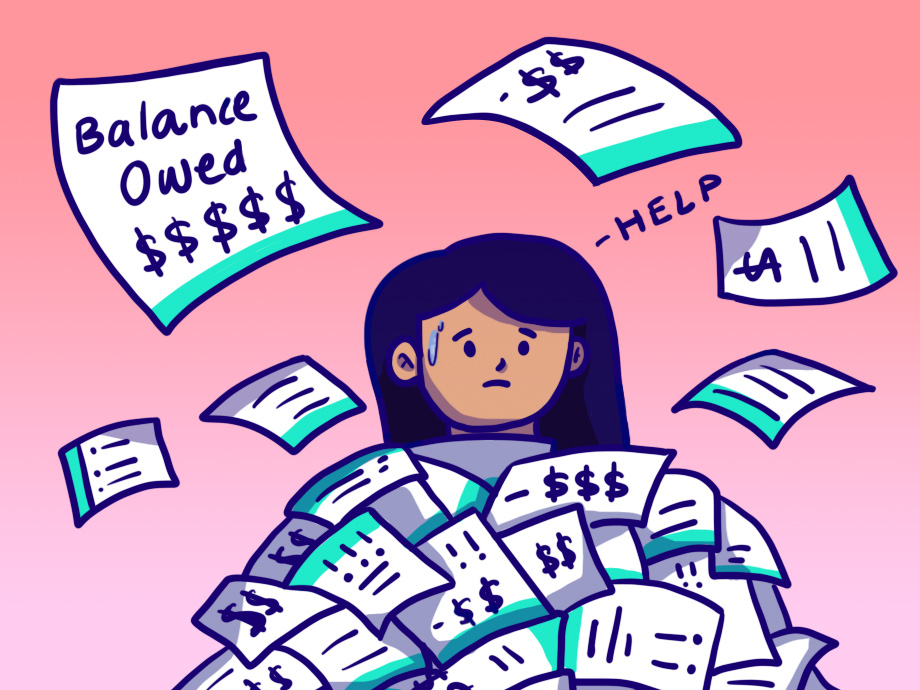Financial Planning | Managing Debt | Personal Finance | Article
Having Difficulty Managing Your Debt? Sometimes, You Need Professional Help
by Ooi May Sim | 6 Jan 2022 | 7 mins read

Imagine this: After meeting the man of your dreams and dating for two years, you get engaged. You start planning for your wedding ceremony at a hotel, with beautiful decorations and a lavish food spread. You take a loan because you want everything to be exactly as you envisioned it. It is, after all, a once in a lifetime occasion!
Next, you look for a new pad as newlyweds – maybe a nice spacious condominium near your workplace. Soon, you are looking at beds, furniture, plates and plants to fill your crib.
Although the bills keep piling up, you figure it is all part of adulting, right?
Before you know it, you are knee high in debt. You keep receiving credit card bills, and the bank is threatening to repossess your car and house.
Honestly, you don’t even know how you got to this point. It all happened so quickly.
So…what can you do?
A lifeline for debtors
Instinctively, the first people you may turn to in times of need would be your family and friends. But if you have multiple debt, your confidantes, although well-meaning, might not be able to help much with restructuring your debt. Borrowing money from a family or friend also puts an invisible strain on a relationship.
This is where financial counsellors, such as those at Agensi Kaunseling dan Pengurusan Kredit (AKPK), step in.
Most of the people who seek help from AKPK have a combination of debt, usually from credit cards, housing and personal loans, shares Nirmala Supramaniam, head of household financial education.
AKPK is a credit counselling and debt management agency set up by Bank Negara Malaysia in 2006 to help individuals take control of their finances. The agency provides professional advice, financial education, and personalised debt management plans that help people recover from debt.

As of Jan 31 2021, AKPK has helped 32,349 people fully settle their debts totalling RM1.5 billion via its Debt Management Programme (DMP).
From this number, 13.7%, or around 45,000 were young adults below the age of 30.
Not all heroes wear capes
To illustrate what happens during each counselling session, Nirmala explains: “If a person who has five credit cards from five different banks comes to AKPK, the first thing we will do is to get him to terminate all the cards.
“Then, we will negotiate with the banks to convert (the debt repayment) to a term loan to extend the tenure. We will structure a repayment plan that is affordable to the borrower and accepted by the financer for a win-win situation for all parties.”
Under the DMP, borrowers make payments though AKPK, who then distributes the money to the banks. This eases the burden of the borrower and ensures a smoother flow of finances.
But while AKPK receives and distributes money between numerous parties, its services are free. “There is no payment to AKPK,” Nirmala stresses.
And, during this time, all legal litigations will be put on hold, so clients won’t be chased for payment by banks and other borrowers.
That’s not to say that individuals can’t restructure their repayment plans on their own, but Nirmala points out that people with multiple debt may find it challenging as all banks have their own policy and restructuring programme. Navigating the different schemes may be perplexing, especially for someone who is not good with budgeting.
Instead, dealing with one entity and making payment once (to AKPK) makes the process more manageable, and debtors are more likely to succeed.
Related
One simple condition
If you do sign up for the DMP programme, the one golden rule to follow is: make your payment on time!
AKPK takes repayment seriously. So, if someone defaults from paying for two consecutive months without a valid reason, the individual will be terminated from the programme.
Unless they have a valid reason, of course!
“If someone has lost their job or has been hospitalised without pay and can provide the proper documentation, we will request for a postponement in payment from the banks.
“But if there is no reason and it is because they are just a habitual late pay master, we have no choice but to terminate the account and he will go back to where he was with the banks,” says Nirmala.
AKPK also cannot help with loans taken from unlicenced money lenders as these transactions are illegal.
Malaysia, we have a debt problem
In March, Finance Minister, Tengku Datuk Seri Zafrul Abdul Aziz said that 40% of millennials are spending beyond their means. Quoting Bank Negara, Tengku Zafrul also revealed that 47% of Malaysian youth have high credit card debt.
Another statistic, from the Malaysian Department of Insolvency shows that close to 60,000 individuals have been declared bankrupt between 2017 and October 2021. Most of the people on this list are between ages 35 to 44 (36.36%).
Among the reasons given as the main cause of bankruptcy were personal loans (37.94%), car loans (17.62%), business loans (11.74%), housing loans (11.18%) and credit card (9.02%).
“A lot of personal financing is taken for lifestyle purposes and for settling old debts, which means debt keeps (increasing),” says Nirmala.
Lifestyle debt, which is often taken to pay for holidays, weddings, or to renovate their homes is not good as they are unproductive (they do not add to a person’s assets), Nirmala says.
Furthermore, spending is much easier now with online shopping. “It is so easy to spend online. If you link your credit cards to an online payment, you just have to click confirm. You don’t even have to key in your card number or take out your wallet. It’s all saved there. This makes it harder for people to save,” she says.
Related
A holistic approach
According to AKPK’s 2020 annual report, the top three reasons people cited for joining the DMP were poor financial planning (36.5%) followed by high cost of living, and the failure or a slowdown of business at 35.3% and 12.2%, respectfully.
So financial literacy is needed in order to teach people how to manage their funds, budget and save. Nirmala says, “It is not how much you get that is important, it is how you manage what you get that is important.
“Many people who take loans don’t understand the type of borrowing they are getting themselves into and the amount they can really afford.”
AKPK unit head Noorhaliza Abu Bakar adds, “For financial education, we are talking about the psychology of money and how you relate to it. It is not just the technical part of the calculations, but about the emotions and how you control it.
“The better you handle your emotion, the better you handle money.”
At the end of the day, debt management goes beyond repayment. Money affects every aspect of our lives and is closely linked to our emotions.
As Nirmala puts it: “If you are financially overburdened, your emotions are affected. And relationships get affected too because you (might snap) at everyone you see.
“It could also affect your job performance if you are worrying about money and unable to concentrate. Eventually, your overall health will suffer.”
If you feel like you are drowning in debt, seek help. The earlier, the better. To get help, visit AKPK’s website to learn about their services, apply for their Debt Management Programme or call their hotline at 03-26167766.


















